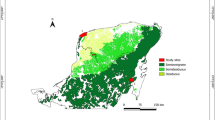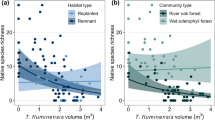Poterium spinosum,
competitive under conditions of overgrazing and fire, accounted for 70%–85% of the total plant cover in all sites, except Santorini, where participation of spiny species was very low. In the recently abandoned sites, annuals accounted for 50%–60% of the standing biomass, but constituted only a tiny fraction in those abandoned for 30 years or more. This was not paralleled by any remarkable increase of the total plant cover. In fact, the yearly produced green biomass decreased with the years after abandonment. The productivity of old fields abandoned for a long time is insufficient to support the grazing animals present. This shortfall, given the animals' requirements, is most dramatic in Symi. The nonrecovering vegetation in the old fields of these mountainous islands constitutes a severe environmental threat; remedial measures appear imperative.
Similar content being viewed by others
Author information
Authors and Affiliations
Rights and permissions
About this article
Cite this article
Giourga, H., Margaris, N. & Vokou, D. Effects of Grazing Pressure on Succession Process and Productivity of Old Fields on Mediterranean Islands. Environmental Management 22, 589–596 (1998). https://doi.org/10.1007/s002679900130
Issue Date:
DOI: https://doi.org/10.1007/s002679900130




